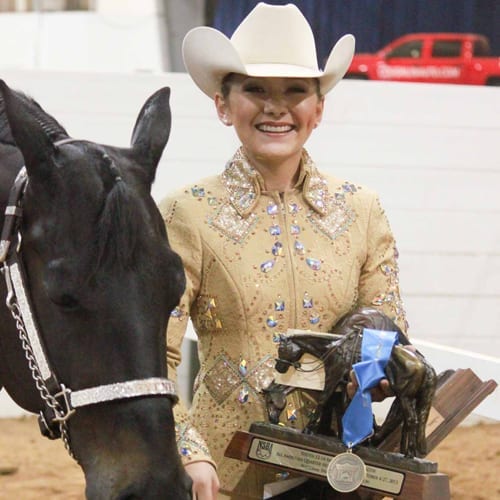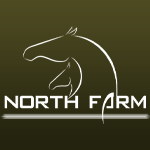Most people agree that the high pressure of the Congress can get the best of even the most veteran showman. Most mental performance coaches agree there is one set of skills that no performer wants to be without for these high pressure moments: relaxation skills. Relaxation skills are the most beneficial mental skill-set any performer can have in their mental skills tool kit. These skills not only improve concentration, but reduce physical tension helping both horse and rider perform at their best.
As a mental performance consultant, I work with athletes from a variety of sport backgrounds, including AQHA equestrians to get mentally prepared for important competitions. I have helped many athletes develop the mental skills to have their “best days on their biggest days” leading to national and world championships and many other personal victories. Equestrians are no different than athletes in other sports in terms of the mental demands of performing at their best under pressure. However, there is an added element to the equation with a thousand or more pound animal as their teammate/partner who’s equally sensitive to mood and nervousness.
Relaxation skills are particularly important for riders whose nerves or anxieties have gotten in the way of a personal best, a top finish or the enjoyment of their competition experience in the past. However, for many, improved relaxation skills and other mental preparation strategies have given athletes the competitive edge they were looking for. Top Olympics athletes commit not only to their physical training, but to the mental preparation that help them be at their best in key moments.
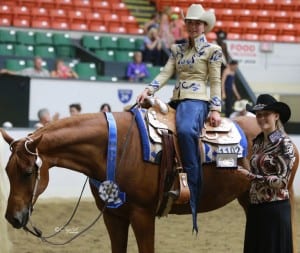 This relaxation mindfulness practice consists of practicing Progressive Muscle Relaxation (P.M.R.), the basic relaxation breath, the centering breath, and tension releasing exercises. By developing in this area, riders can expect improvement in mind/body awareness, and control.
This relaxation mindfulness practice consists of practicing Progressive Muscle Relaxation (P.M.R.), the basic relaxation breath, the centering breath, and tension releasing exercises. By developing in this area, riders can expect improvement in mind/body awareness, and control.
Here’s what one AQHA Competitor said about the benefits of developing these skills: “While managing stress levels is part of showing, I find the mental skills for tension releasing and centering really helped. I can relax myself better before entering in the ring and it shows in my performance. My showmanship patterns flow better and my horse responds to the relaxation under-saddle,” said Roxanne Carter-Thompson, Novice Amateur Competitor who is competing at the 2015 Level 1 Championships and All-American Quarter Horse Congress.
However, achieving a more relaxed mental performance-state in key moments takes more consciousness than you might think. It is best if you practice the skills at home, then in your training environments, in order to be to truly rely on them in the pressure moments at a big show. To get started practicing the skills at home, please visit my website, Ahead In The Game by clicking here.
Many of the athletes I work with practice relaxation and breathing skills regularly. They develop a regular practice of mental training exercises and learn to incorporate key mental strategies during competition. Many quickly start to identify the difference in their mental performance-state and results when they use the skills compared to when they don’t. When athletes see and feel these results, the mental skills become a part of who they are and how they perform.
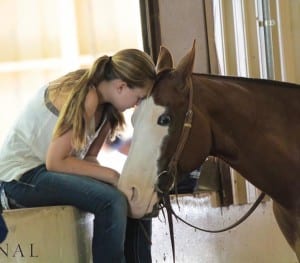 There is a common saying, “insanity is doing the same thing over and over again and expecting different results.” There is a distinct breath pattern that is performance-state enhancing, as well as a breath pattern that will diminish an athlete’s mental performance-state perpetuating further stress and anxiety. One will bring calmness for you and your teammate/partner and one will keep in you in “fight, flight or freeze.”
There is a common saying, “insanity is doing the same thing over and over again and expecting different results.” There is a distinct breath pattern that is performance-state enhancing, as well as a breath pattern that will diminish an athlete’s mental performance-state perpetuating further stress and anxiety. One will bring calmness for you and your teammate/partner and one will keep in you in “fight, flight or freeze.”
The breathing pattern that is shallow, where the chest rises on the in-breath, is an indication you are in ‘stress breathing.’ It is commonly accompanied by other stress indicators such as tension in your body, rushed mental/physical activity, and getting short with yourself and others. The performance enhancing breath is defined by your ability to breathe deeply and calmly in high stress/high stakes moments. This means you can fill your lungs to capacity with oxygen, causing the stomach/ abdominal to expand on the in-breath and to subside on the out-breath. By developing these skills and other aspects of your mental game, you can have a better performance-state in key moments.
 Relaxation skills become a performance tool that will not only help you in showing, but other areas of life as well. One researcher proved that people with no previous meditation experience benefited from 10 minutes of meditation training before taking a pressure-filled math test. The average score of the meditation group was a “B plus” compared to an average of “B minus” for the group with no breathing meditation practice.
Relaxation skills become a performance tool that will not only help you in showing, but other areas of life as well. One researcher proved that people with no previous meditation experience benefited from 10 minutes of meditation training before taking a pressure-filled math test. The average score of the meditation group was a “B plus” compared to an average of “B minus” for the group with no breathing meditation practice.
However, I wouldn’t wait to test the theory and to only give relaxation exercises a try on show day. I highly recommend performers start building relaxation training into a daily or weekly practice and realize other benefits as well. Progressive Muscle Relaxation (P.M.R.) can also been used to aid in post-competition recovery. When you are competing multiple times throughout the week and potentially experiencing shorter sleep cycles, it is amazing how 20 minutes of P.M.R. can help you recover energy. I encourage athletes to do P.M.R. as a mini-break in the action when you are into longer days, and shorter nights. This quiet “time-out” can provide some needed rejuvenation physically and mentally. Additionally, many athletes and individuals use P.M.R. techniques as part of a night-time sleep routine.
The corner-stone exercise for bringing on a more positive-performance-state is the “relaxation breath”. There are a number of variations on this exercise. The basics are to breathe-in deeply through your nose, fill your lungs to capacity with oxygen on a count of two, then pause and to breathe out through your mouth on a count of four. This is also known as the two-to-four breathe.
 For many equestrians I have worked with, they find the centering breath exercise particularly effective for quieting their minds, and connecting with their horse. The centering breath includes the relaxation breath, at the same time concentrating on the center of your body. The ‘center’ is slightly below the belly button. Visualize a line down the center and across your body, where the lines meet at the x-axis, you can locate the center. For a great effect, use the centering breath while mentally rehearsing two to three performance key words. For example, in showmanship you might have performance reminders like, “shoulder back, straight lines, and sharp stop.” This is extremely effective in directing your performance energy in a positive way.
For many equestrians I have worked with, they find the centering breath exercise particularly effective for quieting their minds, and connecting with their horse. The centering breath includes the relaxation breath, at the same time concentrating on the center of your body. The ‘center’ is slightly below the belly button. Visualize a line down the center and across your body, where the lines meet at the x-axis, you can locate the center. For a great effect, use the centering breath while mentally rehearsing two to three performance key words. For example, in showmanship you might have performance reminders like, “shoulder back, straight lines, and sharp stop.” This is extremely effective in directing your performance energy in a positive way.
A modified version of P.M.R. can be done as a standing exercise and is great for reducing tension on the spot. Along with breathing, move your attention from head to your toes, and literally shake out your major muscle groups and areas of your body. It generates energy and oxygen flow and challenges the unconscious, instinctual response to stress of tension “pooling” in certain areas of your body. While everyone has differences, common areas of tension include shoulders, back, neck and jaws. The ‘shaking out’ of tension will help channel and direct the natural adrenaline that comes with performance and competing in sport. As many mental performance coaches will say, “Get your butterflies flying in formation.”
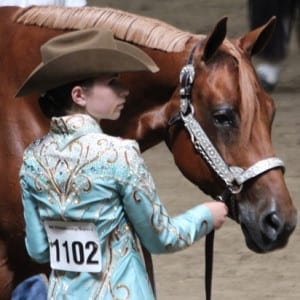 Use a heart rate monitor to become proficient at the relaxation response. Increased heart rate is one of the best bio-feedback indicators of stress. When practicing relaxation, riders can monitor their heart rate and develop the control to lower their heart rate ‘at-will.’ However, equestrians have their own bio-feedback mechanisms in their equine partner /teammate. As with any skill, practice will improve effectiveness. I have taught six year-olds with special needs to achieve better control of their breathing in stressful situations. Relaxation skills are for everyone.
Use a heart rate monitor to become proficient at the relaxation response. Increased heart rate is one of the best bio-feedback indicators of stress. When practicing relaxation, riders can monitor their heart rate and develop the control to lower their heart rate ‘at-will.’ However, equestrians have their own bio-feedback mechanisms in their equine partner /teammate. As with any skill, practice will improve effectiveness. I have taught six year-olds with special needs to achieve better control of their breathing in stressful situations. Relaxation skills are for everyone.
A great place to start is to practice P.M.R. is at home, preferably in a quiet place. You can quickly progress to practicing the deep breathing on the way to training. Incorporate breathing and loosening exercises as part of your physical and mental preparation for competition, and you’ll see the results in the quality of your mindset. You can continue to advance by integrating these techniques into your riding, like the centering exercise during pauses in your training sessions, then progress to breathing while in stride. Before you know it, you will truly be riding every stride.
Visit Ahead in the Game.ca to Practice Relaxation and receive Six Key Show-day Mental Performance Tips.
Ahead in the Game wishes all competitors at this year’s Level 1 Championships and Congress a successful and enjoyable show. See you there!
References
Book – “Choke – What the secrets of the brain reveal about getting it right when you have to” Sian Beilock August 2011
Article – “Getting into the Optimal Performance State” Robert M. Nidiffer, Ph.D
 About the Author: Tara Costello, M.A., Mental Performance Consultant, Member of Canadian Sport Psychology Association, Creator of Ahead Sport Mind Training app available in App Store and Google Play. She supports amateur and professional athletes in achieving regional, national and international success. She has worked with National and World Curling Champions, nationally ranked tennis athletes, NHL/ AHL hockey players, elite golfers & equestrians and many others from a variety of sports to achieve personal victories. Tara has been the Mental Trainer for Special Olympics Team Canada helping them succeed at the 2013 and 2015 World Games. Tara provides in-person and distance-based mental performance consulting to athletes throughout North America. She has experience competing in a variety of sports, including western performance classes.
About the Author: Tara Costello, M.A., Mental Performance Consultant, Member of Canadian Sport Psychology Association, Creator of Ahead Sport Mind Training app available in App Store and Google Play. She supports amateur and professional athletes in achieving regional, national and international success. She has worked with National and World Curling Champions, nationally ranked tennis athletes, NHL/ AHL hockey players, elite golfers & equestrians and many others from a variety of sports to achieve personal victories. Tara has been the Mental Trainer for Special Olympics Team Canada helping them succeed at the 2013 and 2015 World Games. Tara provides in-person and distance-based mental performance consulting to athletes throughout North America. She has experience competing in a variety of sports, including western performance classes.


